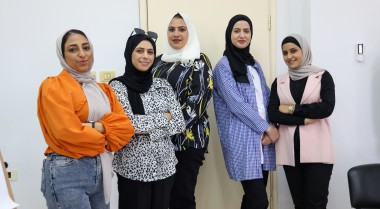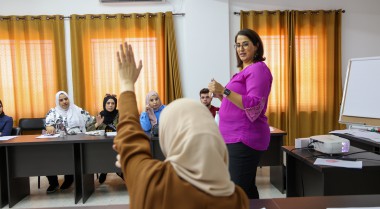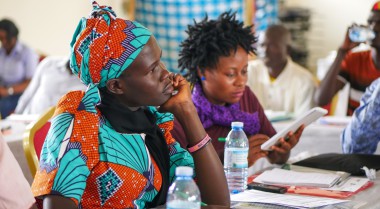
GPPAC as an intermediary: Learnings from Palestine
Hilda Issa is the Executive Director of the feminist organisation Palestinian Center For Peace And Democracy (PCPD), based in Ramallah. In 2022, Hilda and GPPAC, a partner of the Women's Peace and Humanitarian Fund (WPHF) Rapid Response Window, joined forces to empower women to participate in the Palestinian peace process and reconciliation talks.
"When we started this project, we perceived GPPAC as a donor. But things changed quickly, and GPPAC became an equal and trusted partner. We learned alongside each other."
The WPHF Rapid Response Window provides flexible, short-term funding to local organisations to be active actors in peace processes. As an implementing partner of the WPHF, GPPAC supports successful applicants to the Rapid Response Window based on their needs and wishes. The PCPD was the first organisation GPPAC supported to implement its project that empowers young women to participate in peace negotiations and the political space more meaningfully.
"Palestinian women do not believe they are part of the political process. They think politics is for men. We are trying to change this. We want women to be part of the local government and political parties and to run as candidates. We want women to feel secure when they talk about political issues."
Hilda, her team, and GPPAC's project coordinator, Maja, met online regularly from day one of the 6-month long project. This meant translating donors' requirements into accessible language, amplifying their local message to global audiences, or acting as a sounding board without ever dictating or influencing them.
"We experienced continuous support from GPPAC's project coordinator. In our bi-weekly calls, we discussed challenges and problems related to the project but also talked about the political context in which we work. Through our check-ins, we got to know each other and built a relationship of trust and mutual understanding. I believe this will open up opportunities for future exchanges and learning and enhance the sustainability of our organisation, also in terms of funding."
The continuous contact and relationship building not only contributed to the project's success, but it also ensured that Hilda and her team remained in the lead of all aspects of the project – and not mere contractors implementing programs and activities. Throughout the project, Hilda perceived GPPAC's project coordinator as part of the team, inspiring and supporting them.
"Her interventions did not make us feel like we were losing control of the project. We felt complete ownership of our work because rather than telling us what to do, she guided us. Having constant meetings and check-ins with her made us reflect more throughout the project lifespan and helped us formulate our achievements better."
Looking ahead, Hilda wishes to strengthen the relationship she built with GPPAC. The GPPAC network offers the space for collective learning and reflecting, especially from other powerful women. As a good intermediary, using all the lessons learned from this project is also essential to leverage the project and share it with the broader network so that other members can benefit from it too - from the Philippines to Nepal to Kyrgyzstan.


